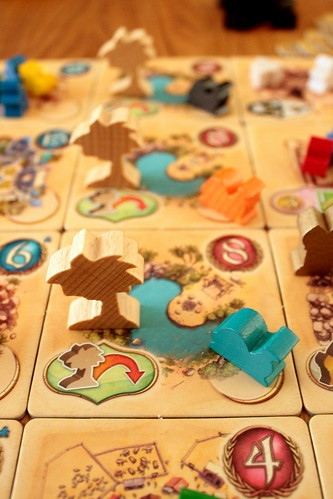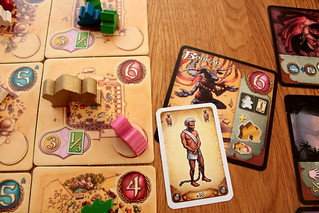| Strategy | Luck |
|---|---|
| Interaction | Components & Design |
| Complexity | Score |
After weeks of traveling your caravan crosses yet another mountain pass and you get your first glimpse of fabled Naqala, Jewel of the Desert, the city-state in the center of the Sea of Sand. As soon as you had heard the news that the old sultan was poorly, you set out on this trip, because there is one thing everyone knows about Naqala: their laws of royal succession allow anyone, even a foreigner who never set foot in the kingdom before, to succeed the sultan. All he needs is the support of the five tribes, and with 50 gold coins in your pocket and the camels in your caravan you are not in a bad position to maneuver the tribes in your favor. Unfortunately for you, your competitors have all the same advantages.
The Sultanate of Naqala, the stage of Five Tribes, is a creation of popular French designer Bruno Cathala and publisher Days of Wonder. Like the introduction says, all players arrive in Naqala with 50 gold pieces and a handful of camels, competing to be the next Sultan. Only no one really cares about being Sultan in the end, it’s once more all about victory points. There are many different ways to score those, but they all involve the five tribes, five different colors of bedoueeple, each with their own special skills. Bedoueeple, as regular readers have certainly guessed, are Bedouin meeple, they are like regular meeple but with turbans.When you arrive in Naqala, members of the five tribes are randomly and evenly spread across the desert, three bedoueeple to each of the thirty desert tiles. This even spread of meeple across the desert will not last, however. As soon as you start manipulating the tribes to gain their favor, they assemble in some parts of the desert, leaving others, well, deserted. The mechanism for that is quite simple, but it goes beautifully with the games setting: it is loosely based on the classic Mancala family of games, a large group of “sowing games” that is very popular in North to Central Africa, right where Naqala might be situated around the Sahara desert.

In Mancala, you pick up all seeds from a pit and sow them into the following pits. In Five Tribes, you pick up all bedoueeple from a desert tile and spread them across the surrounding tiles. There is more freedom in how you distribute meeples across the desert than there it in Mancala, but it’s still quite simple. Starting from the tile you picked up meeples from, you put one meeple on one of its four neighboring tiles, then the next meeple on a tile bordering that tile, and so on. You can not move diagonally and you can not move back to where you just came from. However, you can enter the same tile again if you can complete a circle to get there. There is only one more important rule to how you put your bedoueeple: the last one must land on a tile where a bedoueeple of the same color is already standing. You then pick up all the bedoueeple of that color from the last tile. If the tile is now empty you gain control of it, indicated by a cameeple (camel meeple) in your color placed on the tile. Then, regardless if you took control of the tile or not, you take an action based on the color of bedoueeple you just picked up.
- Yellow bedoueeple, the Viziers, are simple, you just keep all of them around and score points for them at the end of the game. Each Vizier is worth one point, which isn’t all that much, but you also get ten points for each other player with less Viziers than you have. In a four player game that makes up to thirty bonus points, and that is a nice chunk.
- The Elders, white bedoueeple, score two points a piece at the end of the game, but they have another use. When you land on the right type of desert tile the Elders can summon a mighty djinn, a magical being that can help you in ways beyond mere mortal powers.
- The green Merchant bedoueeple let you take resources from the Market, an open row of nine resource cards. For each Merchant you just picked up you take one card from the front. Resources can either be Slaves, useful for some actions, or trade goods that can be exchanged for gold coins.
- Blue Builders bring you money. You count the number of surrounding tiles with a blue score. That’s half of the tiles, but as the desert is randomly built every game it can be anywhere from none, which is very bad for you, to nine, which is a reason to jump around the table ecstatically and praise the djinn in a loud voice. You multiply that number with the number of Builders you just picked up and take that many gold coins. You can use Slave cards as additional Builders and make quite a lot of money that way.
- Finally, the Red Assassins kill one other meeple. That can either be a Vizier or Elder another player has already collected or a meeple still on the board. In the later case, if the assassination empties that tile you take control of it as well.

(I have to get some nitpicking of my chest here: those are not tribes! They are grouped by the job they do, so they are more like castes, or maybe guilds, but not tribes! How would a tribe of Elders even work? When they have children, would they be very young Elders??? Phew, now I feel better, sorry for that. Let’s return to the review of Five Castes …. Tribes.)
After the tribe action you still take the action of the tile you ended your move on. For Oases and Villages, that means simply placing another palm tree or palace on them, respectively. Those award extra points to the owner of the tile. On Market tiles you may buy more resource cards. For a Small Market you pay three gold coins and pick one card of the first three in the Market row, for a Big Market you pay six coins but take two cards from the first six. The score for resource cards is based on how many different types you have collected, a meager single point for a single card up to 60 points for nine different ones. Slaves don’t count for this, and the remaining trade goods are of different rarity. If six coins for a pick from the first six cards sounds expensive, keep in mind that Ivory, Jewels and Gold only show up on two cards each, so if you’re playing a trade goods strategy you’ll really want to grab those when you get the chance.

And then there are the Sacred Places, the last kind of tile found in the desert. They are were the Elders summon powerful djinn for you. You pay either two Elders or an Elder and a Slave and pick one of the three open djinn cards. Those djinn are very powerful indeed, but they are also very specific in their powers. Some of them, like Nekir and Ba’al, give you free money when a specific action is taken. Nekir, for instance, pays you every time the Assassins kill someone. Others, like Shamhat and Haurvatat, give you more points for something at the end of the game. Getting four points per Elder instead of two thanks to Shamhat makes a big difference. And then there are a number of djinn that offer their services for a price, payable in Elders and/or Slaves. That sounds expensive – and inhumane, if you think about it too much – but for abilities like placing a palm tree on any Oasis, or taking control of any empty tile, it’s a low price.
Which djinn you can get early in the game has a big influence on your strategy. Getting three points for a Vizier instead of one is a good incentive to collect them, just like being able to place palm trees simply paying a Slave is a great reason to control some Oases. But to get the djinn you want, when you take your turn is important. In fact, to get any djinn or resource cards at all, turn order is important, because both are only refilled after each round. That’s where the last clever bit of Five Tribes comes in and where most of your money goes to: you buy your place in the turn order, and going first can become really expensive. In the order of the previous round, players pay for a spot in the turn order for the next. To go earlier, you will have to pay more, up to a maximum of 18 coins. Seeing that you start with fifty, and you usually don’t get that much from the Builders, you better be very sure you have to go first.

Paying for turn order is one way players interact in Five Tribes. There is very little direct interaction, really only when you kill another player’s Viziers or Elders, but there is a lot of competition for very limited resources. Three djinn per round, nine resource cards, a limited number of bedoueeple on the board and, especially late in the game, only a few options to get the tribe you want or the tile you want, let alone both at the same time. And what resources you need is not all you have to think about. There are very different strategies in Five Tribes – collecting resource cards, controlling valuable tiles, getting just a few villages but filling them up with palaces, … – and you have to decide what you want to score the big points with and then make it work. And all those strategies do have a chance to win, usually when coupled with a healthy dose of opportunism for picking up other points where you can. Combine that with the more tactical consideration where you can make a good move that helps your strategy, ideally in more than one way, without giving your opponents a too big opening for their own move. Nevertheless, the rules take about five minutes to explain, there are no exceptions to any rule that you’d have to remember, getting ready to play takes about as long as ripping the plastic wrap from the box.
So I hope you understand now why I was upset not to see Five Tribes in the Kennerspiel des Jahres selection. It’s exactly the type of game I would expect to see there, with simple rules yet strategically interesting, interactive almost without negative interaction and looking as good as we’ve come to expect from Days of Wonder. If Scheherazade had introduced Five Tribes to her Sultan, he’d have given up on beheading her after the second night. And if I was betting on the Spiel des Jahres awards, I’d be a whole lot poorer now.















